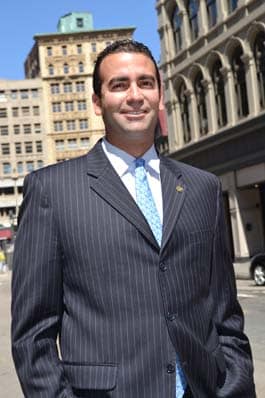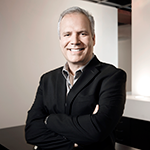
The Latino/Hispanic population of Boston is unique. While most major US cities are home to one dominant category—Cubans in Miami or Mexicans in Los Angeles—Boston’s Latinos and Hispanics come from many diverse backgrounds.
One such immigrant is Radhames Nova, executive director of ALPFA Boston. Nova was born in Santo Domingo, Dominican Republic, and moved to the United States in 1989 at age 13. He landed in Lawrence, a small city north of Boston among a Latino majority. Because Nova spoke no English, he enrolled in a bilingual program at the local public high school before a scholarship from the Boys and Girls Club of Lawrence took him to an all boys, private Catholic school. There, Nova found himself isolated among English speakers, forced to learn their language in the classroom and on the basketball court.
Nova says his entry into the “foreign” culture of the Boston-area school coupled with the diverse Latino population around him set the stage for his career. The experience led him to pursue a linguistics degree from a small liberal arts school and study French and Italian in Paris and Florence. He became a United States citizen at age 21 and enrolled in the Peace Corps, serving in South Africa. The experience took him back into fundraising projects and ultimately back to the Boys and Girls Club, where he helped raise $8 million in a capital campaign. He joined Fidelity Investments in a move that drove him to connect with other professionals. In doing so, he found ALPFA, an organization created to build Latino business leaders.
In 2011, Nova became the Boston chapter’s executive director, working with a staff of two employees and 28 mid-career professional volunteers. Together, they serve the Boston area as part of a national organization dedicated to serving Latino business professionals. Although the association started as a hub for CPAs, it has moved into other areas from law to health care. ALPFA now lists 120 student and 41 professional chapters on its national roster.
ALPFA’s Boston chapter is second in size only to New York, with 3,000 professionals and students. While the national association draws 53 percent of its members from students, ALPFA Boston is 60 percent professional. “We are a young organization and must mentor these students who will become our professional members and future business leaders,” Nova says. To do so, he drives outreach on college campuses, often traveling outside of the city to suburban schools where he and other business leaders connect with young Latinos. Boston, after all, is home to numerous large employers. Many of those companies—more than 45—sponsor ALPFA Boston and look to the association to provide Latino talent.
Monthly events at ALPFA Boston attract between 100 and 200 people and always include a professional development component. Additionally, critical networking meetings help area Latinos share resources, ideas, and opportunities. The meetings, Nova says, are perhaps more important than ever. “Boston has strong companies that have been managed by Irish and Italian-American communities. Our members have great backgrounds, but might not stand out in the crowd due to other factors. Thus, our networking events and sponsoring companies give our members a starting point and a way to market themselves,”
he explains.
Five years ago, ALPFA Boston—once dedicated solely to accountants—expanded its reach to Latino attorneys and then health care and investment professionals. Pilot programs led to successful annual events that now reach several top area law, investment banking, and medical communities. The association now offers free chartered financial analyst (CFA) review sessions for its members.
Today, Latinos represent 18 percent of the city. East Boston is home to more Hispanics than Caucasians. According to Nova, Latinos stand to benefit from the lack of one dominant Hispanic ethnicity. “There are several nationalities here among the Latino and Hispanic community,” he says. “That leads businesses to seek out diversity and the Latino community’s growing purchasing power. Companies are looking to us to bring something that is needed to their business’ bottom line.”
For Latinos like Nova and other ALPFA members, the group provides solidarity. “When I started in finance, I felt like I was the only Latino in the entire company, but when I attended an ALPFA event I found a group of 300 Latino professionals with advanced degrees who hold great roles in the city of Boston,” he says. Getting together in one group eliminates a feeling of isolation and helps those with a common background form tight bonds through which they can offer friendship and professional guidance.
Hispanics in Boston stand to benefit from the city’s varied professional landscape, which includes major employers from baking and finance to health care, education, insurance, and biotech. Additionally, the area’s renowned universities like Harvard, Bentley, Brandeis, and MIT are looking to ALPFA to identify Latino post-graduate candidates. According to Hispanic Outlook in Higher Education 2012, more than 25 percent of Hispanics above the age of 25 did not complete high school, 14 percent hold a bachelor’s degree, and 4 percent have an advanced degree. Nearly 40 percent of ALPFA’s members hold advanced degrees. “Our members are bit more business oriented than the average population,” explains Nova, attributing the low number of Hispanic advanced degree holders to first-generation immigrants unfamiliar with the competitive and expensive nature of the US system of higher education.
Nova attended Vermont’s Middlebury College, one of New England’s top schools. “On paper, I never should have been accepted,” he says. Mentors through other schools and leaders in the Boys & Girls Club paved the way for his success. Today, the Latino leader looks to pass that help on to others in his life. “I have been in this country for 23 years and I have seen the importance of a graduate degree,” he says. “I have two daughters who will likely get advanced degrees because we will teach them about the impact that opportunity and education has had on our lives.”
Relationships have been big for Nova, and networking remains a big focus for ALPFA Boston. “It’s not that you have to know the right powerful people. Networking helps you build relationships with people who know you, respect you, and want to help you when you have a need or a question.” The idea is particularly important for those who emigrated directly from Latin America, where asking for help is frowned upon. Latinos, Nova says, must embrace the American practice of asking for an interview, or a job opportunity, or a piece of advice. “Help is never a negative thing if you ask for it in the right way,” he says. “Meeting people will always open doors for you.”

